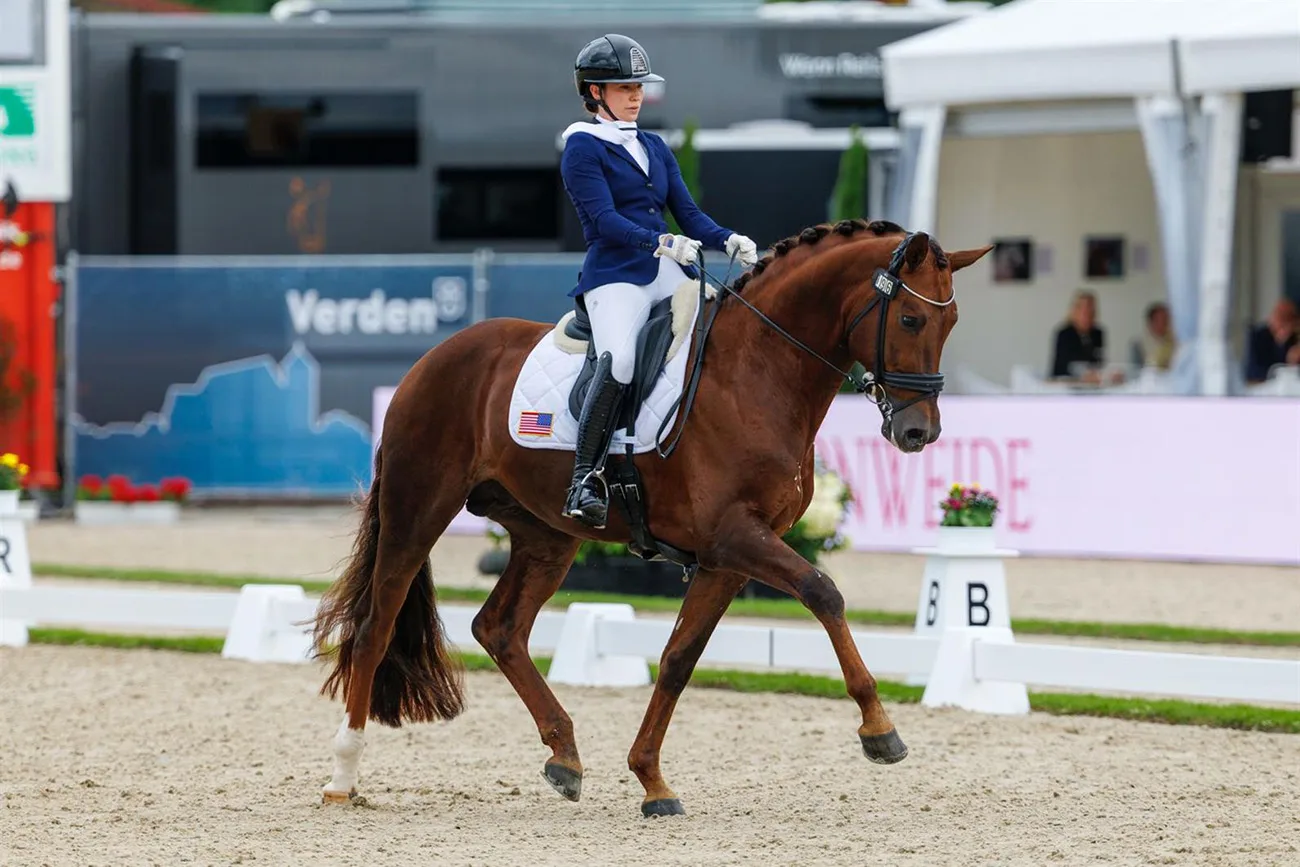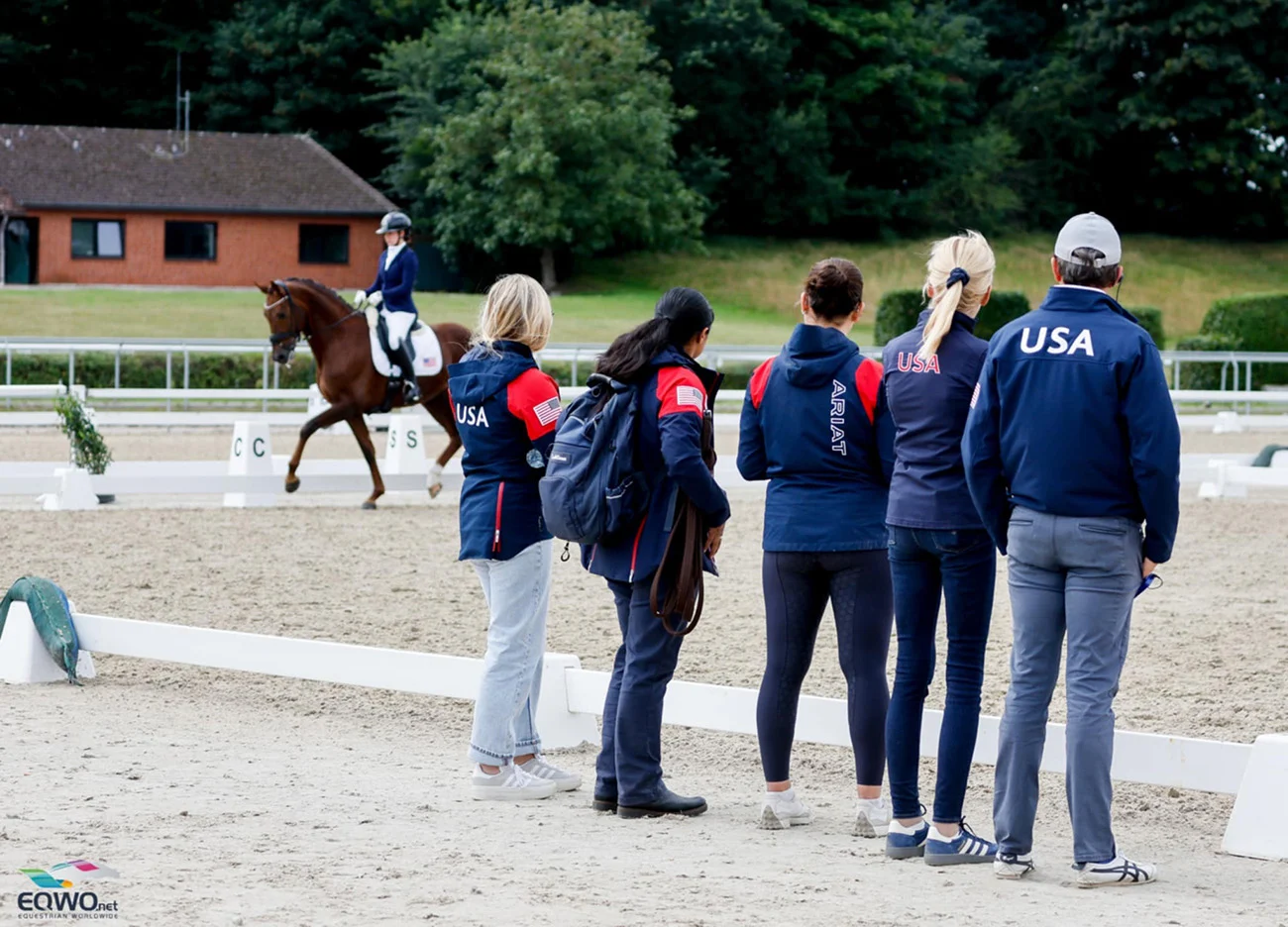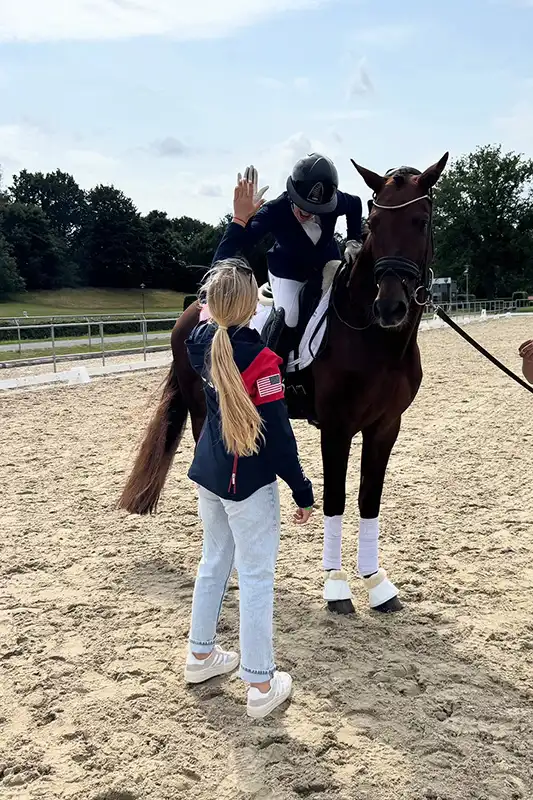Life has been full of accomplishments and exciting moments for dressage professional Hope Cooper over the past year: She got married, finished her master’s degree in organizational psychology, and found success in the show ring with her group of young international horses. But she also endured heartbreak when her promising Grand Prix horse Tripple X died of impaction colic last year.
“We had spent a lot of years together,” said Cooper, who was hoping the Totilas offspring would be her next big-time horse after the retirement of her other Grand Prix mount, Flynn PCH, in 2024. “We did the Developing Grand Prix, and he was super special—a little quirky but just absolutely amazing piaffe and passage, and we had really created an incredible partnership. It was just horrible, as it always is, for anyone who loses a horse.”
Though she was grieving her partner and their promising future, a new door opened when she was asked last August to ride O Romeo S, a now-6-year-old Dutch Warmblood stallion (Charmeur—Evanta III MMW, UB 40) owned by Tammy Richard, Mark Richard and McKenzie Dicks. Bred by Sonnenberg Farm in the United States and started by Caroline Roffman, “Ollie” will eventually become a schoolmaster for Richard’s granddaughter, Kenzie Dicks. For now, Cooper is giving him lots of show ring experience, and over the winter season in Florida, they earned four wins out of six starts in the CDIYH 6-year-old tests in Florida.
In June, they were named as one of three combinations—along with Roffman (Onassis) and Rebecca Rigdon (Stay Cool), although Roffman ultimately did not compete due to a poorly timed hot nail for Onassis—to represent the U.S. at this year’s FEI WBFSH Dressage World Breeding Championship for Young Horses, held Aug. 5-10 in Verden, Germany.

The pair made it to the 6-year-old finals, where they finished 12th on a score of 82.40% behind winners Dinja Van Liere and Red Viper of the Netherlands (90.40%).
Cooper, 28, admitted to being nervous on the first day of competition, representing her country for the first time since her U25 years. But she needn’t have worried; Ollie was thrilled to find himself in front of the knowledgeable, enthusiastic German crowd.
“He really feels like, the bigger the crowd, the better for him,” Cooper said. “We do a lot of talking in our sport about, do the horses love what they do? What are we asking of them? And I have to say, showing a horse like that, especially in front of a big crowd, it makes me feel like he absolutely loves his job. He just showed up and was like, ‘I’m showing off, whether you asked me to or not.’ He really did the job for me, even as a 6-year-old.”
Their Day 1 score of 83.40% put them in 12th place out of 40 entrants and qualified them for Saturday’s large final—a rare accomplishment for a U.S. pair at the world young horse championships. That confidence-boosting placing gave Cooper a whole different mindset for the final, she said.
“I was just over the moon,” she said. “On the last day, we really were able to just show off, because I feel like I was less nervous, I was more confident, and I was just like, ‘We’re both meant to be in here.’ ”
As a rider and trainer, Cooper said the experience of competing against the best in the world, in front of a large, supportive crowd, was something she’ll carry forward with her.
“It was totally an honor to be competing in that stadium, and also with the caliber of horses and riders that were there,” she said. “To have that many people in the stands, it really makes you feel like the sport is so appreciated for what it is, and the beauty of it, and the harmony between horse and rider. I really feel like the people in the stands really appreciated that; it was just an atmosphere of love for the horses and love of the sport.”

Cooper hadn’t previously had the chance to campaign in the FEI young horse classes much and saw the opportunity to go to Verden as a steppingstone in her own and Ollie’s career.
“I have had a few 4-year-olds in my career so far, and then it wasn’t the focus, and then some of the more successful horses that I’ve had are honestly horses that didn’t come with any training but were kind of older,” she said. “Maybe they had a change or something, but they were bought for like, a third level adult amateur, and then it kind of turned out as they learned the rest of the work that they were talented in the Grand Prix work.
“I haven’t had an opportunity like this before, with a horse like this and a family that’s this supportive,” she continued. “I think that’s a key thing in the sport, is that we have really supportive owners, too, and I am just beyond appreciative to them to let me have an opportunity like this.”
ADVERTISEMENT
When Cooper got the ride on Ollie, she wasn’t sure what their goals would be, but with help from her trainer, German Grand Prix rider Christoph Koschel, and her mother, Grand Prix rider Jane Karol, the pair started racking up top placings and scores.
“We were expecting to have fun and to go out there and see what happened,” she said. “And then he really blew us out of the water. We started a little bit in the national ring. It took me a second to sort of figure out how much to ask in the ring, because he can be a hotter horse. And then once I sort of figured out and built a relationship with him, we went into the CDI ring and seemed to really get rewarded for how willing he is. He has three really good, correct gaits, and he’s just strong in his body in a really nice way. There’s no extra riding that I have to do in the arena. He’s just attentive and happy to go with very little aids and questions.”

Roffman got to know Cooper over the past year. She’s been following their progress closely and is thrilled with their accomplishments.
“She was the first to reach out to me and tell me what a great horse it was and how great of a job we had done producing him,” Roffman said. “Then we just kind of bonded and stayed in touch. What’s better than to root on a horse that you believe in, and a rider that you know is making it happen?”
Roffman and her team got Ollie when he was 2 and backed him. Sometimes they’d play bridleless or bareback. “He was a really good boy,” said Roffman. “It’s funny because he is of a bloodline that a lot of people are very superstitious about. He comes from a horse called Charmeur, and if you ask most people, I think they would tell you Charmeurs are very difficult, and [Ollie] really was not, even as a stallion.”
Cooper is very appreciative of the job Roffman and her team did with Ollie. “It’s a real testament to her and her program and how she trains horses and the level of confidence that Ollie had coming up as a young horse,” she said.
“It’s nice when the horse has such nice basics, and you can just sort of make him your own, tune him to your own feeling and train him the rest of the way up the levels.”
Cooper describes Ollie as a goofy type on the ground.
“Once he has the relationship with you, he is just beyond willing to go above and beyond what you’re asking and try with his whole heart every ride,” she said. “He genuinely seems like he loves the work. He’s just a funny guy. He always has a sense of humor. He’s very confident. He’s maybe over-confident a little bit. He’s just always adding his flair a little bit into learning new things but always so willing.”
In the barn, groom Josie Zeeb and Cooper are the horse’s primary caretakers. Cooper also credits her former groom Paul Harmon, who recently retired, with keeping the stallion happy.
“Josie does a fantastic job with him,” said Cooper. “He’s a little bit cheeky in the barn sometimes, but in a very funny way. He loves his paddock. He loves being a horse during most of the day, and then he really loves his people and being groomed.”
A Strong Start
Cooper and her mother are based at their Bear Spot Farm in Acton, Massachusetts. Cooper grew up immersed in dressage and was exposed to different ways of teaching as Karol is both a competitor and a doctoral-level psychotherapist with an equine-assisted psychotherapy program.
As she got serious about dressage, Cooper had a series of hand-me-down horses and ponies from both Karol and her lesson program. Her first FEI horse was Don Diamond, an Oldenburg gelding (Don Gregory—Reine Seide, Rohdiamont) who took her to the FEI North American Junior and Young Rider Championships in 2013 and 2014 and then on to the Under-25 Grand Prix division.
ADVERTISEMENT
Cooper also got the ride on Mary Mansfield’s Hot Chocolate W, a Hanoverian gelding (Hochadel—Pikolina, Pik Senior) who took her from the U-25 Grand Prix to her first CDI3*s and CDI-Ws. With the gelding, she was able to spend time training in Germany with Koschel, and she also trained with Isabell Werth for a few months.
“Mary called [‘Chocolate’] her grandma horse,” said Cooper. “Mary just wanted a very sweet, safe horse to ride. And he also came maybe a little more educated than ‘Diamond.’ He had, like, a single change and some beginning work of some other things, and we really meshed. He learned so fast. I don’t even remember how we did all of that work, but he was just so smart, and he caught on. Now he is a little bit of a therapy horse in our program; he mostly is in a paddock all day! And Mary still owns him.”

Cooper also got a chance to compete Flynn PCH, a Hanoverian stallion (Falsterbo 11—Walt Lady, Walt Disney I) who served as a schoolmaster for her in the open Grand Prix classes. He retired last year. “ ‘Flynn’ is one of those horses that you miss when you’re not with him,” she said. “I mean, really, they all are, but Flynn gave me my first experience with a stallion, and he’s just such a special horse you can’t even put it into words.”
Cooper attended Connecticut College where she triple-majored in behavioral neuroscience, dance and Africana studies. She recently completed an online master’s degree in organizational psychology from William James College (Massachusetts).
“I always just loved school and learning,” she explained. “Even if it’s on the side from the horses, I just think taking classes and broadening your world perspective makes you a better rider. So, I’ve sort of just tried to keep that going at the same time, even when it was online and part time.” Cooper sees her three undergraduate majors as connected in a way—trying to have a deeper understanding of the world.
She’s found her recent degree in organizational psychology to be useful in helping run Bear Spot’s program as well as her own. She teaches, rides and runs a group of about 12 staff members at the farm. She also keeps busy with a handful of competition horses, including Quintus G, an 8-year-old Westphalian gelding (Quartz II Adelheid Z—Cidra G) competing at Prix St. Georges, and Martina Rozumberkova’s Kenzo, a 10-year-old Dutch Warmblood gelding (Dream Boy—Uginia) competing at fourth level.
The mother-daughter duo is very close, though Cooper jokes there are sometimes disagreements.
“I’ve learned everything from her. She’s truly my best friend,” she said. “Doing this work together has always made us super close. And I love the way that she works with the horses—that it’s just such a broad understanding of the horses and their internal world and trying all the time to think more about what they’re thinking and feeling.
“Good horse people always do that, but sometimes with certain people, you can lose that a little bit in trying to get to the top of the sport,” she continued. “It’s always her No. 1 priority, that we’re understanding the mind of the horse and imagining what they’re feeling all the time, whether you’re trying to go for the Olympics or you’re just walking around on a long rein or brushing your horse. [The focus is] always getting out of our own selves and also listening to what the horses are telling us about ourselves.”
Cooper said her main goal in the sport is to be the best trainer and rider she can be and continue her education, but riding on a team for the U.S. is on her bucket list.
“Hope is really just kind, honest, funny, and she’s a team player,” said Roffman. “I really think she’s one of the good ones. She is humble and obviously is a good rider and is getting it done. She’s eager to learn, immersing herself with great people like her trainer, Christoph, and obviously her mom. But she really is a class act, and I’m lucky to call her a friend.”
With additional reporting from Melissa Wright
A version of this article originally appeared in the July 2025 issue of The Chronicle of the Horse. You can subscribe and get online access to a digital version and then enjoy a year of The Chronicle of the Horse. If you’re just following COTH online, you’re missing so much great unique content. Each print issue of the Chronicle is full of in-depth competition news, fascinating features, probing looks at issues within the sports of hunter/jumper, eventing and dressage, and stunning photography.














